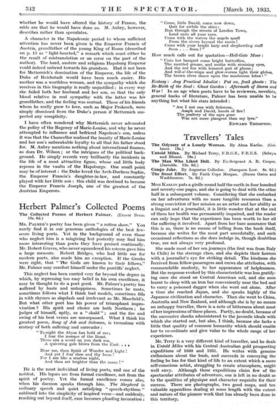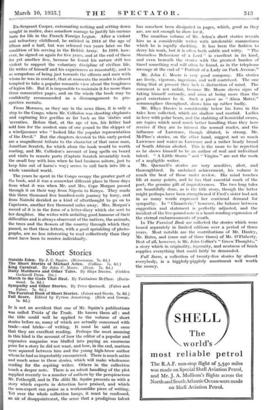Travellers' Tales
The Man Who Liked Hell. By Ex-Sergeant A. R. Cooper. (Jarrolds. 12s. 6d.)
Miss KARLIN puts a girdle round half the earth in four hundred and seventy-one pages, and she is going to deal with the other half in a subsequent volume. Considering that she embarked on her adventures with no more tangible resources than a strong conviction of her mission as an artist and her ability as a linguist and a journalist, it is little wonder that at the end of them her health was permanently impaired, and the reader can only hope that the experience has been worth to her all the suffering it involved. Apart from her bare assurance that this is so, there is no means of telling from the book itself, because she writes for the most part anecdotally, and such occasional reflections as she does indulge in, though doubtless true, are not always very profound.
She made most of her sea journeys (the first was from Italy to Chile) in the steerage class, and she depicts their horrors with a journalist's eye for striking detail. The kindness she received from fellow-passengers and crews she attributes, with commendable modesty, to her appearance of helplessness. But the response evoked by this characteristic was less gratify- ing once she stood on Central American soil, and she soon learnt to sleep with an iron bar conveniently near the bed and to carry a poisoned dagger when she went out alone. After a time she reached Japan, and she speaks highly of the Japanese civilization and character. Then she went to China, Australia and New Zealand, and although she is by no means an unhappy traveller, there is a note of bitterness about most of her impressions of these places. Partly, no doubt, because of
the successive shocks administered to the juvenile ideals with which she started out, but also, I think, because she lacks a little that quality of common humanity which should enable her to co-ordinate and give value to the whole range of her experience.
Mr. Terry is a very different kind of traveller, and he deals in Untold Miles with his Central Australian gold prospecting
expeditions of 1930 and 1931. He writes with genuine enthusiasm about the bush, and succeeds in conveying the feeling he has for that kind of life to an extent which a more self-conscious artist, struggling to create atmosphere, might well envy. Although these expeditions claim few of the spectacular attributes of adventure, one is left in no doubt as to the qualities of physique and character requisite for their success. There are photographs, two good maps, and ten valuable appendices dealing at some length with the extent and nature of the pioneer work that has already been done in this territory. Ex-Sergeant Cooper, extenuating nothing and setting down nought in malice, does somehow manage to justify his curious taste for life in the French Foreign Legion. After a violent and refractory childhood, he enlisted in 1914 at the age of fifteen and a half, but was released two years later on the condition of his serving in the British Army. In 1919, how- ever, he signed on again for five years, and at the end of these for yet another five, because he found his nature still too violent to support the voluntary discipline of civilian life. He writes of himself and his experiences so reasonably, and is so scrupulous of being just towards the officers and men with whom he was in contact, that at moments the reader is almost tempted to take a popular romantic view about the toughness of legion life. But it is impossible to maintain it for more than three consecutive pages, and on the whole the book may be confidently recommended as a discouragement to pro- spective recruits.
From Morocco, as they say in the news films, it is only a step to the Congo, where Mr. Collodon was shooting elephants and capturing live gorillas as far back as the 'sixties and 'seventies. Before that, at the age of ten, his father had sold him for the modest sum of one pound to the skipper of a windjammer who " looked like the popular representation of the Devil." But the chapters devoted to this early period are a magnificent tribute to the character of that same man, Jonathan Scratch, for which alone the book would be worth reading, and Mr. Collodon's account of long spells on board and visits to remote ports (Captain Scratch invariably took the small boy with him when he had business ashore, just to keep him out of harm's way) seems to call back into life a whole vanished world.
The years he spent in the Congo occupy the greater part of the book, and it was a somewhat different place in those days from what it was when Mr. and Mrs. Cope Morgan passed through it on their way from Nigeria to Kenya. They made this three thousand five hundred-mile journey by lorry, and from Nairobi decided as a kind of afterthought to go on to Capetown, another five thousand miles away. Mrs. Morgan's record of it is in the form of a letter-diary which she sent to her daughter. She writes with unfailing good humour of their difficulties and is always observant of the natives, the animals, the trees and the flowers of the country through which they passed, so that these letters, with a good sprinkling of photo- graphs, are no less interesting to read collectively than they must have been to receive individually.







































 Previous page
Previous page